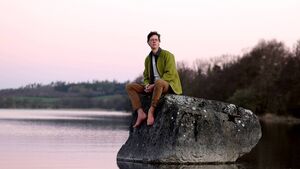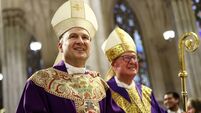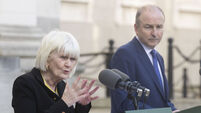Manchán Magan was an Irish cultural giant

Manchán Magan pictured at Lough Lene in Co Westmeath earlier this year. Picture: INPHO/James Crombie
The death last Thursday of the writer and broadcaster Manchán Magan has been greeted with a huge wave of sadness right across Ireland, in keeping with his monumental contributions to Irish life and culture.
Death always brings sadness but it is ever more so when there is a real sense that the person had so much more to give and that is definitely the case with Manchán. Almost single handedly, he reinvigorated our language, its culture and traditions and so many other aspects of our past that become more and more frayed with every passing generation. He also reignited an appreciation in us for our landscape and the natural world around us. His work as a writer and a broadcaster awoke a sleeping passion in Irish folk for our rich heritage and guided people to look deeper into our own surroundings.
His was a quiet crusade. He wasn’t literally banging drums but bringing people on journeys of discovery through his wonderful storytelling, be it in the written word or on TV and radio. I consider myself extremely fortunate to have worked with Manchán in recent years through the publication of three of his books with Mayo Books Press. A few things were readily apparent when you were working with him.
Firstly, his grá and belief in the importance of what he was doing. His often modest ego did not see himself as a saviour of Irish culture, but he knew the importance of recognising it, preserving it. And, gratefully, he had the gift of making it fascinating and accessible, therefore ensuring it came to as wide an audience as possible.
That brilliance was another very obvious trait. Manchán was also incredibly hardworking and never seemed to stop. His output was off the charts. I recall him stationed in Canada whilst filming a documentary and having a three-hour window in between which he used to read forensically through the latest proof of his book, . If he did not reply to an email within half an hour, you were kind of worried. He was always on, always driven and always thinking ahead to the next project and challenge.
He was a real pro. Often gifted writers are unproductive. Manchán was both. It was hard to keep up with him at times. The breadth of his work is staggering. And though he was utterly the driving force behind everything, he had a great way of making everyone who collaborated with him feel as if it would not have been possible without their input. He conducted himself with such grace in this regard and had a deep emotional intelligence.
That was most apparent for me in the production of . This was the first book I worked with Manchán on and was a most intriguing production. He would test your own powers of description if you were trying to describe the book to anyone. The official blurb described it as ‘a gathering of Irish words for vaginas, vulvas, clitorises and periods’. Try explaining that to your parents’ generation!
It was an utterly unique and inspired idea for a book. Showing Manchán at his collaborative best, it featured illustrations for over 100 such words from 29 artists and Manchán constantly sought to divert credit from himself to the artists.
His more recent books with Mayo Books Press explored the fascinating commonalities between the cultures of Ireland and India, firstly, and, secondly, the cultures of Ireland and Iceland. A third book, exploring the connections with Ireland and the Aboriginal cultures of Australia, is in gestation.
The ‘India’ and ‘Iceland’ books reveal surprising and unheralded connections between those cultures and our own. Aside from exploring such rich connections, these books also guide us to exploring the shared roots we have with distant lands, how no culture or identity is homogenous. It is an important point in the current vicious vortex about immigration. We are all deeply connected around the world. There are none of us who are purely Irish.
Manchán was the epitome of the best of Irish culture in this regard – broadminded and considerate. ‘With curiosity and care’ is part of the blurb for explaining how Manchán explored these cultural connections and I think that’s a fitting epitaph for him as a writer.
He was so curious and interested, always on the lookout for new strands to explore and discover. And when he found them, he treated them with a preciousness that’s rare in writing. He curated them for us, the readers, to increase our own appreciation and make our own discoveries.
It might be deep-rooted but fading aspects of our own culture, language and heritage or the cultural ties to other people around the world. Manchán explored them all with curiosity and care.
His most successful book was both in a commercial sense and in terms of how it reconnected so many people with the richness of the culture and language around them. It spawned a considerable increase in the revived interest in Irish language and culture in recent years.
He showed us how rooted the language is in the land around us. His TV work across decades was always fascinating, whether it was travel shows around the world or exploring aspects of our own culture.
His last interview was on the on RTÉ Radio 1 in September. He had been living with cancer for over a year but he was confident it was under control. However, it is a merciless beast and he confirmed in that interview that it was terminal. He hoped he might get a year or two but certainly a few months. He didn’t even get one month. In the midst of it all, he spoke openly about his feelings, saying he had not felt much despair or self-pity.
There was always something otherworldly about Manchán. One hopes he will inhabit that now.
Paying tribute to him on Friday, deputy editor Conor Goodman (Manchán was a former columnist and frequent contributor to the ) put it aptly.
“We often use the term ‘force of nature’ to denote a very assertive person, but Manchán was a force of nature in a better sense: gentle, yet powerful, inspiring and humbling.”
Manchán Magan was a national treasure. He was only 55 and had so much more to give. But we were blessed to have him and his legacy will live on for generations to come.





